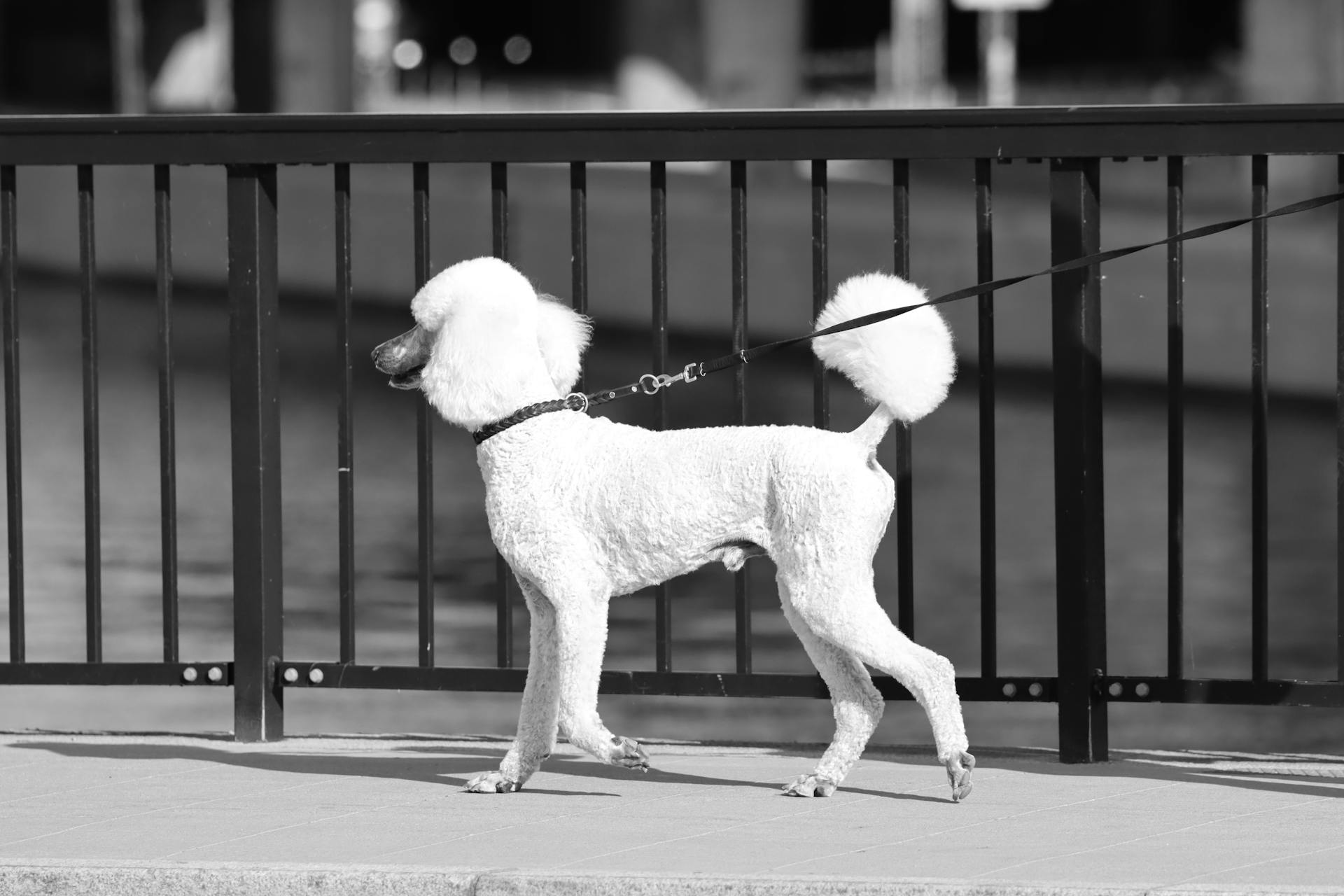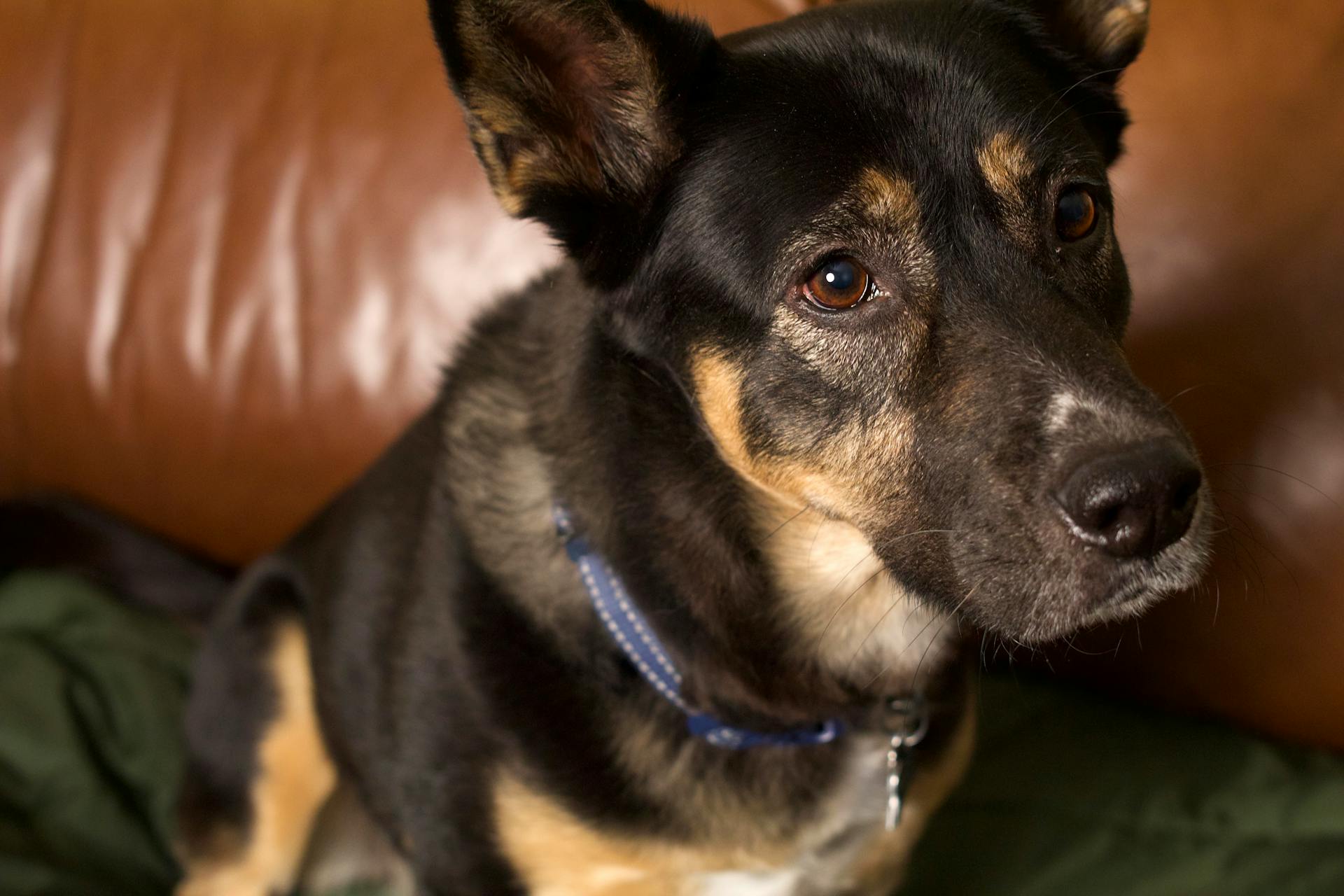
The Bich Poo breed is a delightful mix of Bichon Frise and Poodle, making them a great companion for many families. They are known for their low-shedding coat, which requires regular grooming.
Bich Poos are generally friendly and outgoing, getting along well with children and other pets. However, they can be wary of strangers and may require some time to warm up to new people.
Their small size, typically weighing between 7-12 pounds, makes them a great choice for city living or for families with smaller spaces. With proper care and attention, Bich Poos can live up to 12-15 years, providing a long and loving relationship with their owners.
Health and Care
The bich poo breed requires regular grooming to keep their coat healthy and tangle-free. They need to be brushed at least once a week, and regular visits to the groomer for haircuts and nail trims are a must.
Their dental care is also crucial, as they are predisposed to periodontal disease. Brushing their teeth every single day is essential to prevent this condition.
Bich poo owners should be aware of the potential health issues that can arise, such as eye issues, bladder stones, and Addison's disease. Regular vet visits and preventive care can help keep these conditions at bay.
Here are some common health issues that can affect bich poo breeds:
- Patellar luxation - This is where the kneecaps slip out of place when walking, causing pain and discomfort.
- Retinal atrophy and cataracts - These conditions can lead to blindness if left untreated.
- Addison's disease - This is an immune-mediated disease that can be life-threatening.
- Cushing's disease - This condition can result in kidney damage and diabetes.
To ensure their health and happiness, bich poo breeds need a cool environment to live in, socialization with people and other animals, and regular grooming to keep their coat healthy and tangle-free.
Coat Grooming and Maintenance
Bich-poo owners know that these adorable dogs require regular grooming to prevent matting and tangling. Their coats are prone to knots, so daily brushing is a must.
To prevent matting, you'll want to brush your Bich-poo with a metal comb and soft slicker brush about two to three times per week. This will help keep their coat looking healthy and shiny.
Bathing your Bich-poo every 4-6 weeks is recommended, or as needed. You can also choose to bathe them more frequently if they get dirty. Using a high-quality dog shampoo will help keep their coat clean and soft.
Regular grooming also helps distribute natural oils throughout the coat, keeping it healthy and shiny. A slicker brush and metal comb are recommended for grooming a Bich-poo.
Don't forget to avoid getting water in their ears during bathing, as this can lead to ear infections. Using dog ear cleaning wipes can help keep their ears clean and healthy.
You'll also want to check and clean their ears once a week, as Bich-poos are prone to ear infections.
Expand your knowledge: Healthy Bulldog Breeds
Diet and Nutrition
Bichon Poo owners need to provide their furry friends with a well-balanced diet that meets their nutritional needs. High-quality dog food with a mix of protein, carbohydrates, and healthy fats is the way to go.
Small dogs like Bichon Poos benefit from eating more frequently throughout the day, as they have smaller stomachs and higher metabolic rates. This can help prevent excessive weight gain.
It's essential to avoid overfeeding and monitor their weight to prevent obesity. This is especially crucial for Bichon Poos, as they are susceptible to diabetes.
You might like: Shih Poo Weight
The best dog foods for Bichon Poos are those that meet AAFCO guidelines and are formulated by a veterinary nutritionist. These foods have undergone feeding trials to ensure their quality.
To determine how much to feed your Bichon Poo, check the guidelines on your preferred dog food or use an online calculator to calculate their daily caloric needs.
See what others are reading: Breeding Bichon Frise
Exercise and Activity
The Bich-poo breed requires a minimum of 30 minutes of activity each day to stay happy and healthy. This can be achieved through short walks, playtime in the yard, or interactive games with their owners.
Rainy days don't have to be a problem, as Bichon-Poos can get by skipping a walk and still get exercise at home by playing active games like fetch or tug. However, if your pet is being destructive, it's a good idea to increase the amount of time spent exercising them.
Bich-Poos are active dogs that enjoy short walks, playtime in the yard, and interactive games, so it's essential to provide them with enough exercise to prevent boredom and destructive behavior.
Related reading: Short Bulldog Breeds
Activity Requirements
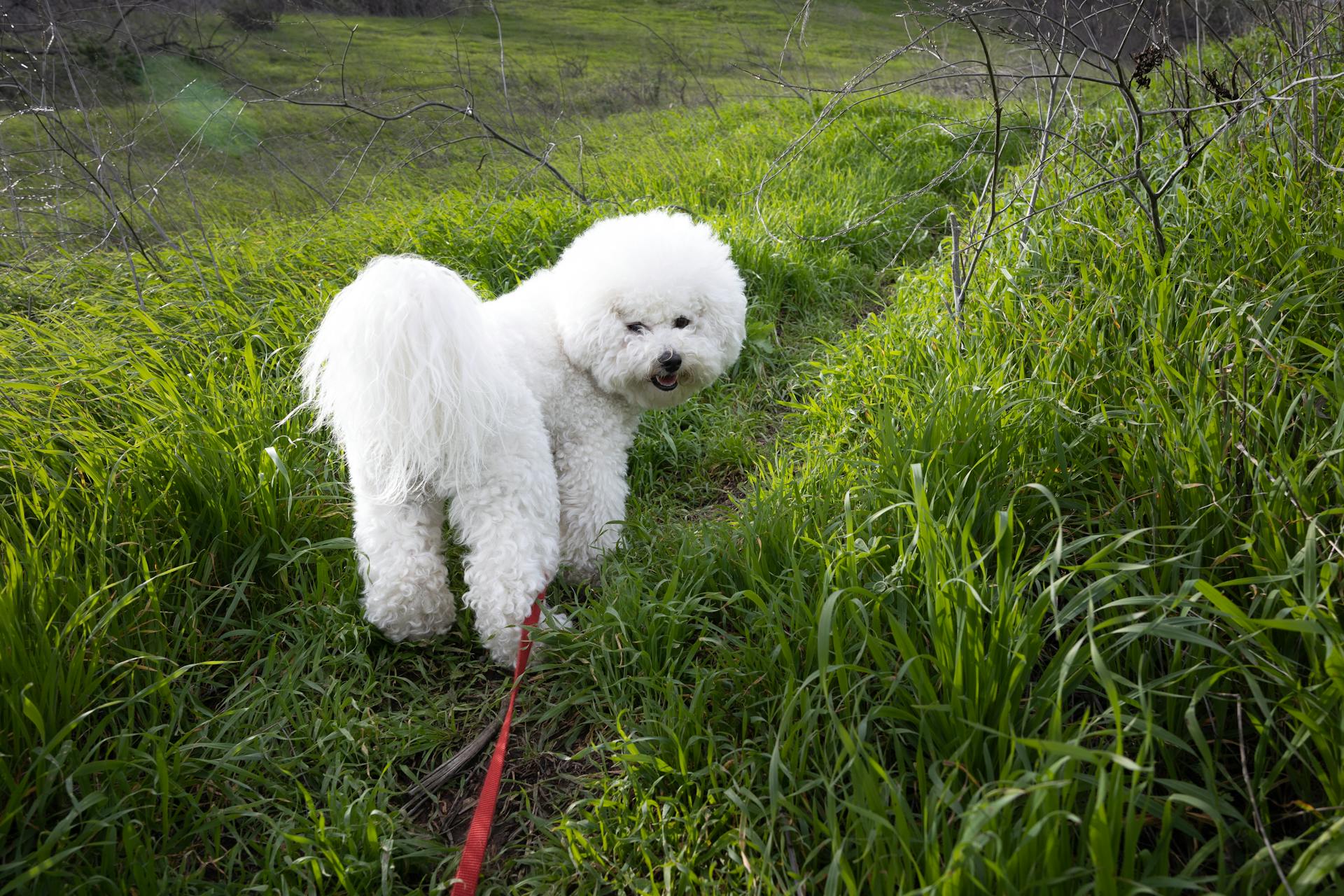
Bich-Poos are active dogs that require daily exercise to keep them healthy and happy.
They need at least 30 minutes of activity each day to prevent boredom and destructive behavior. If they don't have access to a backyard, they may need even more time for exercise.
A dog park visit, playdate session, or short forest trek can be a great way to add physical and mental stimulation to their week. This can help reduce destructive behaviors like barking, chewing, or whining.
You can also exercise your Bich-Poo at home by playing active games with them, like fetch or tug. Just make sure to adjust the amount of exercise based on their age, size, and health.
Even on rainy days, Bich-Poos can get by without a walk, but they'll still need some form of exercise to stay happy and healthy.
What Size Is It?
When considering the exercise needs of a Bichon Poodle, it's essential to understand their size.
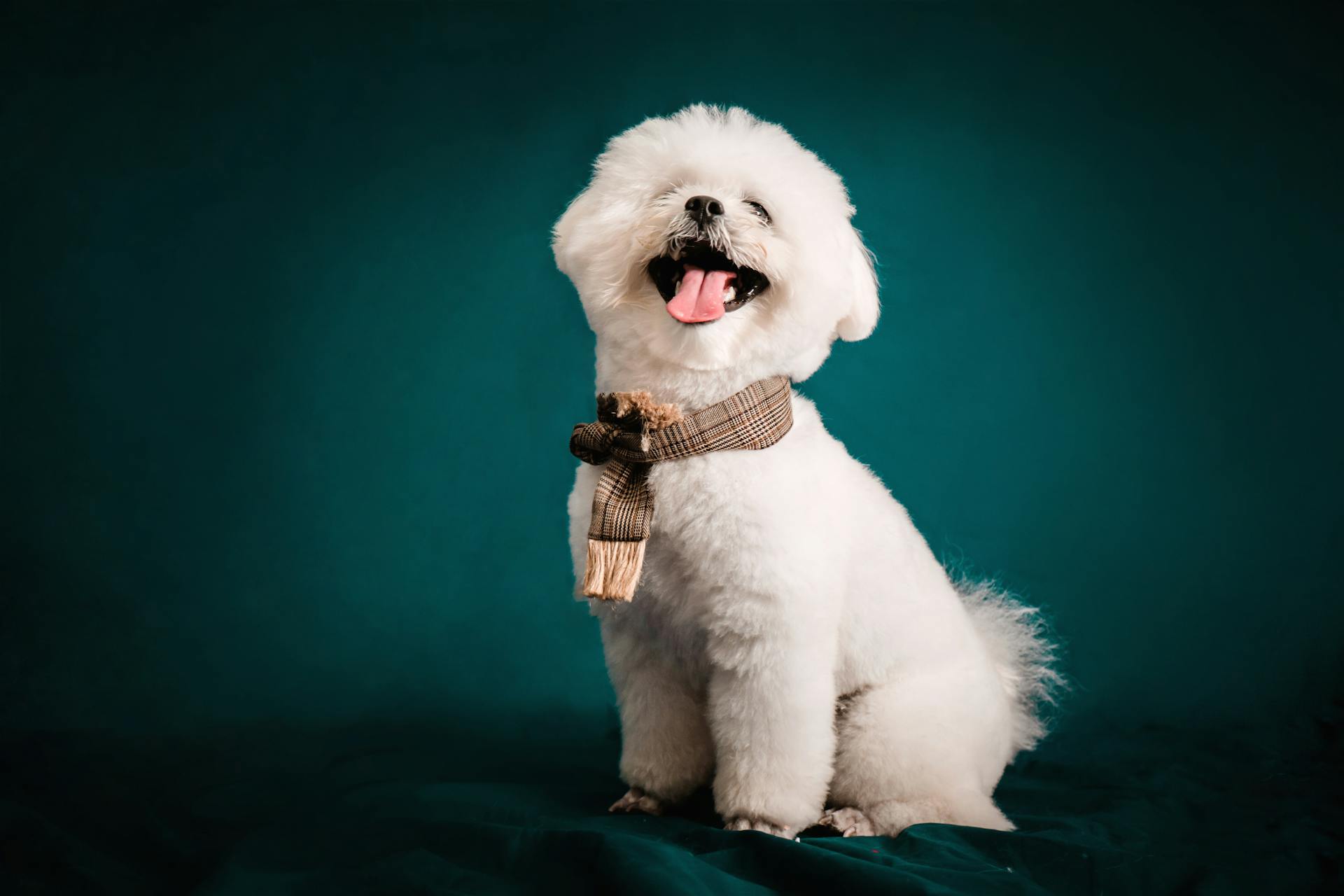
A Bichon Poodle typically stands between 9 to 15 inches tall.
Their weight range is also quite variable, averaging between 6 and 17 pounds.
Those with a toy poodle parent tend to be on the smaller side, while those with a miniature poodle parent may be larger.
Their curly and long hair requires regular grooming to prevent matting.
This is a maintenance task that should be factored into your exercise routine.
A fresh viewpoint: Teacup Poodle Breed
Training and Behavior
Training a Bichon Poodle, also known as a Bichpoo, is a joy because they are intelligent and eager to please.
These dogs are smart and can learn a plethora of interesting cues, including complicated tricks. They thrive on praise and treats from their favorite people.
Bichpoos are relatively easy to train, so hiring a professional trainer is not necessary, but taking them to a training class can be helpful for socialization and structure.
Consistency is key when training a Bichon Frise Poodle Mix, so use the same commands and techniques every time to avoid confusion.
Positive reinforcement works well with Bichpoos, so be sure to praise good behavior and avoid punishment.
Socialization is crucial for Bichon Frise Poodle Mix puppies, exposing them to different people, animals, and environments helps them become well-rounded and confident dogs.
Obedience classes can be a great way to improve a Bichon Frise Poodle Mix's training and socialization, providing structured training and socialization opportunities with other dogs and people.
Training should be fun, not a chore, so keep it positive and engaging for your Bichpoo.
For another approach, see: Cute Husky Mix Breeds
Temperament & Intelligence
Bichon Poodles are incredibly intelligent dogs, known to excel in obedience training and pick up complex tricks with ease.
Their high emotional awareness makes them attentive to the well-being of their families, which is why they thrive on human companionship.
Bichon Poodles are social dogs that don't do well being left alone for long hours, and can develop separation anxiety if they're home alone for too long.
They're ideal for people working from home or families where at least one person is usually home, but you can also look into doggy daycares and dog walking services for days you'll be away.
Bichon Poodles are known for being intelligent and easy to train, making them a great choice for first-time dog owners.
Poochons, a hybrid breed of Bichon Frise and Toy or Miniature Poodle, are also intelligent and easy to train, and are known to be great companions for families with children.
Their playful nature means they love to play and are always up for a game of fetch or tug-of-war, but they're also content to just cuddle up with their owners and relax.
With their intelligence and easy-going nature, Bichon Poodles and Poochons make great companions and are sure to bring joy and happiness to any household.
Their loyalty and devotion to their owners is unmatched, and they thrive on attention and love to be with their families.
They're quite active for their size and need plenty of activity to stay mentally stimulated, making them a great fit for families who enjoy outdoor activities.
Check this out: How to Train Shih Poo
Living with a Poochon
Living with a Poochon is a joy, but it's essential to provide the right environment for their happiness and health. Poochons are adaptable dogs that can thrive in apartments, condos, and small homes, but they do require some specific living conditions.
They need enough space to move around and play, and they love to be around people and other animals. In fact, they thrive in homes where they receive plenty of attention and affection from their owners. Regular socialization is key to ensure they get along well with other pets.
To keep their curly coat healthy and tangle-free, Poochons require regular grooming, including brushing at least once a week and regular visits to the groomer for haircuts and nail trims. This will also prevent skin irritations and infections.
Are Apartment Dogs?
Living with a Poochon in an apartment can be a great option. They don't need a yard to be happy, and they can get their exercise through walks or indoor games.
Their barking habits are worth considering, but aside from that, they can thrive in apartment living. They're intelligent and can learn complex commands, making them a great choice for apartment dwellers.
Bichon poodles, the parent breed of the Poochon, are too small to fit every service niche, but they can make fantastic service dogs in general. They're loving and affectionate, making them a great option for someone looking for an emotional support animal.
Their friendly nature would also make them a great option for a therapy dog, as they tend to be quite friendly and do well with children and adults.
Suitability with Children and Animals
Living with a Poochon means considering their suitability with children and other animals. Poochons are a great choice for families with kids, as they are friendly and playful, and love to be around people. They are also gentle and patient, making them a great companion for children of all ages.
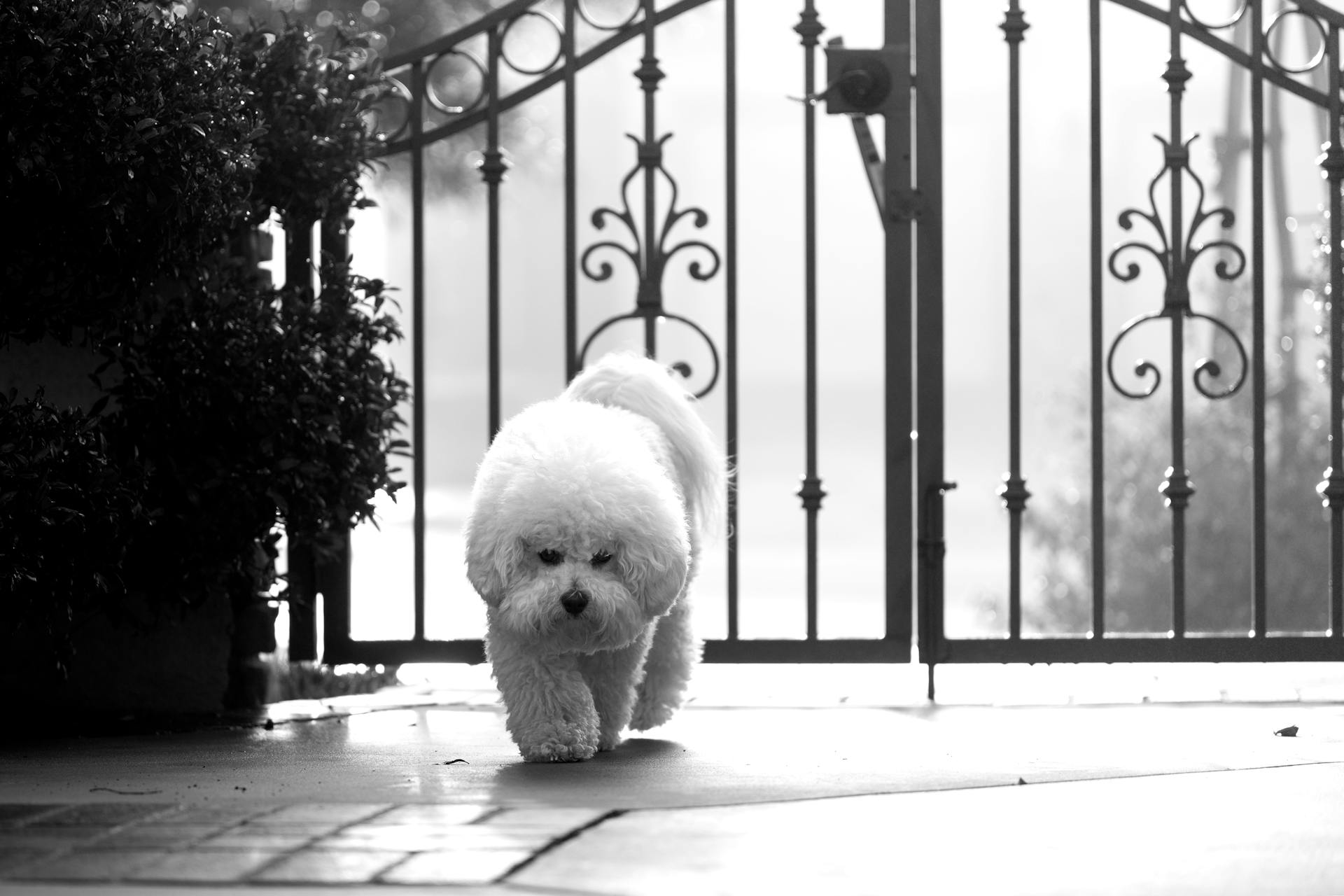
However, it's essential to supervise young children around any dog, including the Poochon, to ensure they treat the dog with respect. Poochons can get snappy if they're not well socialized, so it's crucial to teach children how to interact with them safely.
If you have small pets like rabbits or guinea pigs, be aware that a Poochon may see them as prey. Socializing a Poochon puppy with small animals can help, but it's recommended to exercise caution if you decide to keep small pets in a home with a Poochon.
On the other hand, Poochons tend to be quite friendly toward fellow dogs and can even get along with cats if raised with a tolerant cat during their youth. This makes them a great addition to multi-pet households.
Overall, with proper socialization and supervision, Poochons can thrive in households with children and other animals, making them a wonderful companion for many families.
Finding and Owning a Poochon
Finding a Bichon Poodle can be a challenge, especially if you're looking to adopt one from a shelter. Most Bichon Poodle mixes won't exceed 20 pounds.
You can try contacting shelters dedicated to rescuing Bichon Frises or small Poodles, as they often have Bichpoo mixes available. Keep in mind that these dogs are in high demand, so be prepared to travel or wait.
Bichon Poodles are a popular hybrid breed, which means they may not be as readily available as other breeds. However, with patience and persistence, you can find the perfect furry companion.
Finding a Breeder
Finding a reputable breeder for your Poochon is crucial to ensure you're getting a healthy and well-cared-for puppy. You can start by asking the right questions to verify the breeder's credentials.
A reputable breeder should have a good understanding of the breed and its needs, so ask about their experience and credentials. They should be able to provide you with information about their health testing and vaccination records for the parent animals.
You should also ask to see the living conditions of the dogs and meet the parent animals to get a sense of their temperaments and the potential temperaments of the puppies. A respectful breeder will be happy to show you around and answer any questions you may have.
To ensure the puppies are well-socialized, ask the breeder about their socialization process and how they interact with the puppies from an early age. This will help you get a sense of the puppy's personality and confidence.
Here are some questions to ask a breeder to ensure they're reputable:
- What are your credentials?
- Have the parent animals undergone health testing?
- Can I see where the dogs are kept?
- Can I meet the parent?
- How do you socialize your puppies?
- Are the puppies up-to-date on vaccinations?
- Do you offer a health guarantee with a contract?
- What do you require of potential adopters?
By asking these questions and doing your research, you can find a reputable breeder who prioritizes the health and well-being of their dogs.
Where to Get
You can't usually find a Poochon at a shelter, so you'll need to think outside the box.
Bichon Poodle mixes, like Poochons, are often not available at shelters, but you can try looking for shelters dedicated to rescuing Bichon Frises or small Poodles.
Small breed rescues are another option to consider.
Are Expensive?
You can find Poochon puppies for sale for anywhere from $600 to $3,000.
Just because puppies are cheap doesn't mean they've been bred unethically, and just because they're expensive doesn't mean they've been bred ethically. It's essential to research and ask questions about the breeder and the puppy's lineage.
Your recurring monthly expenses for a Poochon will mostly consist of grooming and food.
Grooming can be a significant expense, especially for a breed with a long, curly coat like the Poochon.
Poochons require regular grooming to prevent matting and tangling, which can be painful and even lead to skin infections.
Frequently Asked Questions
What are the problems with Bichpoos?
Bichpoos can be prone to health issues such as patellar luxation, hip dysplasia, and dental problems. Regular veterinary check-ups and a balanced lifestyle can help prevent or manage these conditions.
Are bichpoos aggressive?
Bichpoos are generally not aggressive, but proper socialization during puppyhood is crucial to prevent fearfulness and ensure a friendly temperament. Proper socialization can help prevent aggression in bichpoos.
What is another name for a Bichonpoo?
Another name for a Bichonpoo is Bichpoo.
Featured Images: pexels.com
